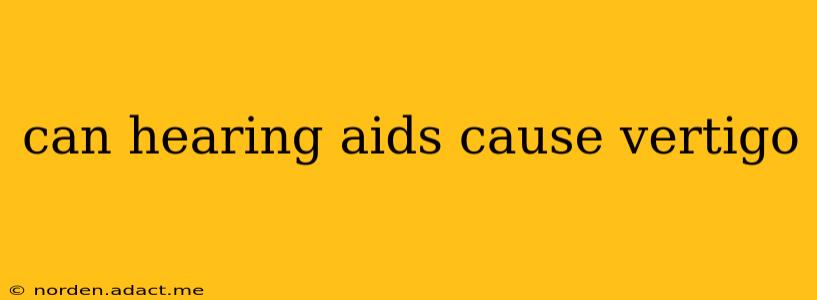Can Hearing Aids Cause Vertigo? Understanding the Connection
Vertigo, that unsettling sensation of spinning or dizziness, can be a debilitating experience. While hearing aids significantly improve the lives of millions with hearing loss, some users report experiencing vertigo after starting hearing aid use. This raises the crucial question: can hearing aids actually cause vertigo? The short answer is: not directly, but they can sometimes exacerbate existing conditions or contribute to feelings of dizziness indirectly. Let's explore this complex relationship in detail.
What Causes Vertigo?
Before delving into the hearing aid connection, it's essential to understand the root causes of vertigo. Vertigo isn't a condition in itself, but a symptom of an underlying problem often related to the inner ear. These problems can include:
- Benign Paroxysmal Positional Vertigo (BPPV): This is the most common cause, involving loose calcium crystals in the inner ear canals that trigger vertigo when the head changes position.
- Vestibular Neuritis: Inflammation of the vestibular nerve, which connects the inner ear to the brain.
- Ménière's Disease: A disorder affecting the inner ear, causing vertigo, tinnitus (ringing in the ears), and hearing loss.
- Labrynthitis: Inflammation of the inner ear's labyrinth, affecting both hearing and balance.
- Ototoxicity: Damage to the inner ear caused by certain medications.
How Can Hearing Aids Contribute to Feelings of Dizziness?
Hearing aids themselves don't directly cause vertigo. However, several factors related to their use can contribute to dizziness or worsen pre-existing vestibular conditions:
- Sudden Changes in Auditory Input: For individuals with significant hearing loss, the sudden influx of amplified sounds can initially feel overwhelming and disorienting, potentially leading to feelings of dizziness or lightheadedness. This is especially true with powerful amplification or improper fitting.
- Ear Infections or Blockages: Ill-fitting hearing aids can create a breeding ground for ear infections. Ear infections and blockages can directly impact the inner ear and trigger vertigo symptoms.
- Pressure Changes in the Ear Canal: Poorly fitted hearing aids can create pressure changes in the ear canal, potentially affecting balance and contributing to feelings of dizziness.
- Exacerbation of Pre-existing Conditions: Individuals with underlying vestibular problems might find that the slight changes in pressure or increased auditory stimulation from hearing aids worsen their pre-existing vertigo.
Can a Hearing Aid Make Existing Vertigo Worse?
Yes, in some cases, a hearing aid can exacerbate pre-existing vertigo. If you have a history of vertigo or balance problems, it's crucial to discuss this with your audiologist before getting fitted for hearing aids. They can help you choose appropriate devices and settings to minimize the risk of triggering dizziness.
What Should I Do if My Hearing Aids Cause Dizziness?
If you experience dizziness or vertigo after starting to use hearing aids, consult your audiologist immediately. Do not attempt to adjust the settings yourself. Your audiologist can:
- Check the fit of your hearing aids: Ensuring a proper fit is crucial to prevent pressure changes and potential infections.
- Adjust the amplification levels: Gradual adjustments can help your brain adapt to the increased sound input.
- Evaluate for underlying medical conditions: They can rule out or diagnose any underlying ear or balance problems.
- Recommend alternative hearing aid styles or technologies: Different hearing aids might be better suited to your individual needs and sensitivities.
How Can I Minimize the Risk of Vertigo from Hearing Aids?
- Gradual Adjustment: Begin using your hearing aids for short periods and gradually increase the wearing time.
- Proper Fitting: Ensure your hearing aids are fitted correctly by a qualified audiologist.
- Regular Cleaning and Maintenance: Keep your hearing aids clean to prevent infections.
- Open Communication with Your Audiologist: Report any dizziness or discomfort immediately.
In conclusion, while hearing aids themselves don't directly cause vertigo, they can indirectly contribute to feelings of dizziness, particularly in individuals with pre-existing conditions or improperly fitted devices. Open communication with your audiologist and a gradual adjustment period are essential to minimize this risk and ensure a comfortable hearing aid experience.
